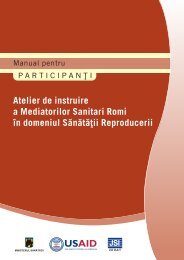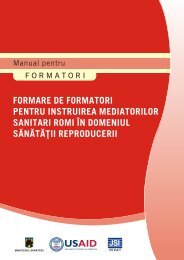Training of Roma Health Mediators in Reproductive Health
Training of Roma Health Mediators in Reproductive Health
Training of Roma Health Mediators in Reproductive Health
Create successful ePaper yourself
Turn your PDF publications into a flip-book with our unique Google optimized e-Paper software.
• Certa<strong>in</strong> responses communicate a lack <strong>of</strong> acceptance <strong>of</strong> the person or a desire to<br />
change or control them. Certa<strong>in</strong> imply that the person is <strong>in</strong>capable <strong>of</strong> mak<strong>in</strong>g a<br />
decision and deny the person the responsibility for their problem and solution.<br />
Ask the group:<br />
‣ What usually happens <strong>in</strong> a conversation:<br />
-- You speak . . . . I listen<br />
-- I speak . . . . . you listen<br />
or<br />
-- You speak . . . . . . . . . . . . .<br />
I listen – evaluate – listen – plan – listen – prepare what I’m go<strong>in</strong>g to say – speak (at<br />
the first chance I get to <strong>in</strong>terrupt you).<br />
Expla<strong>in</strong> that, <strong>in</strong> fact, we <strong>of</strong>ten evaluate what others say before try<strong>in</strong>g to understand them; <strong>in</strong><br />
so do<strong>in</strong>g, we risk draw<strong>in</strong>g false conclusions.<br />
Distribute the participant document Obstacles to Communication. Ask volunteers to read<br />
and comment the additional obstacles on page 3.<br />
III.<br />
CONDITIONS THAT FAVOR POSITIVE COMMUNICATION (15 m<strong>in</strong>utes)<br />
Ask the group:<br />
‣ What k<strong>in</strong>d <strong>of</strong> conditions do we need to create <strong>in</strong> order to make it easier for a woman<br />
to discuss freely her situation (problems, concerns, feel<strong>in</strong>gs)?<br />
We need to create a relationship <strong>of</strong> mutual trust and respect:<br />
• Establish a positive and constructive rapport with the woman<br />
• Try to understand the woman’s situation and feel<strong>in</strong>gs, and any problems she may<br />
have <strong>in</strong> talk<strong>in</strong>g about her situation<br />
• Be will<strong>in</strong>g and able to accept and respect the woman without judg<strong>in</strong>g her<br />
• Be ready and will<strong>in</strong>g to help<br />
• Be objective <strong>in</strong> <strong>in</strong>teract<strong>in</strong>g with the woman<br />
• Pay attention to the relationship between what we say verbally and our non-verbal<br />
messages. (The woman’s perception <strong>of</strong> our non-verbal behavior is <strong>of</strong>ten more<br />
important than what we say verbally.)<br />
• Ask for feedback from the woman if we are unsure <strong>of</strong> whether or not we are<br />
understand<strong>in</strong>g each other or whether <strong>in</strong>formation we are giv<strong>in</strong>g her is helpful;<br />
respect the woman’s feedback; and respond constructively to it.<br />
• Use language (words, expressions) that are understood by the woman<br />
Expla<strong>in</strong> to the group that the follow<strong>in</strong>g sessions will focus on creat<strong>in</strong>g the conditions, and<br />
us<strong>in</strong>g communication skills, that facilitate positive communication with women <strong>in</strong> our<br />
communities.<br />
208<br />
RFHI/JSI <strong>Roma</strong>nia <strong>Tra<strong>in</strong><strong>in</strong>g</strong> <strong>of</strong> RHMs <strong>in</strong> <strong>Reproductive</strong> <strong>Health</strong> Session 14: Interpersonal Communication








